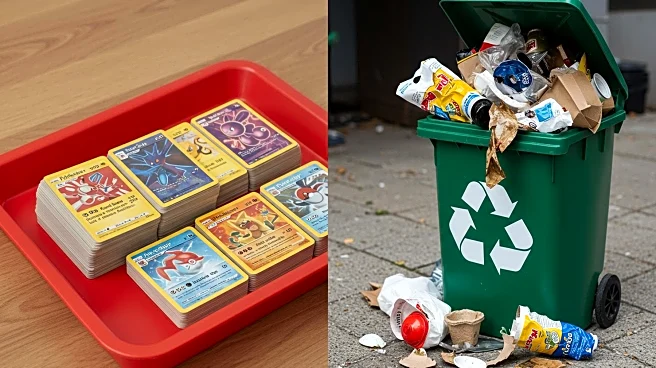What's Happening?
McDonald's has introduced new restrictions to address the issue of scalpers buying large quantities of Happy Meals solely for the Pokémon cards included in them. This move comes after a recent promotion in Japan led to significant food wastage, with scalpers discarding uneaten meals after obtaining the cards. The fast-food chain ran out of cards within hours, prompting an apology to disappointed customers. In response, McDonald's has set a limit of three Happy Meals per group, down from the previous higher limit per person, and has removed Pokémon cards from the promotion, offering only toys instead. The company aims to prevent the resale of cards and the abandonment of food, although enforcement measures remain unclear.
Why It's Important?
The restrictions highlight the challenges faced by companies in managing popular promotions that attract scalpers, leading to unintended consequences such as food waste and customer dissatisfaction. McDonald's decision to limit purchases and remove cards from the promotion reflects a broader effort to balance consumer demand with ethical considerations. This situation underscores the impact of social media in amplifying public outrage and influencing corporate policies. The move may affect McDonald's brand reputation and customer loyalty, particularly among families and young Pokémon fans who were unable to obtain the cards.
What's Next?
McDonald's plans to continue reviewing and improving its sales methods, taking into account feedback from customers and staff. The company may explore additional measures to prevent scalping and ensure fair access to promotional items. Stakeholders, including Pokémon fans and consumer advocacy groups, may push for more transparent and enforceable policies. The incident could lead to broader discussions on corporate responsibility in managing promotions and addressing food waste.
Beyond the Headlines
The situation raises ethical questions about consumer behavior and corporate responsibility in promotions. It highlights the need for companies to consider the environmental impact of their marketing strategies, particularly in terms of food waste. The incident may prompt other businesses to reevaluate their promotional practices and implement measures to prevent similar issues.









